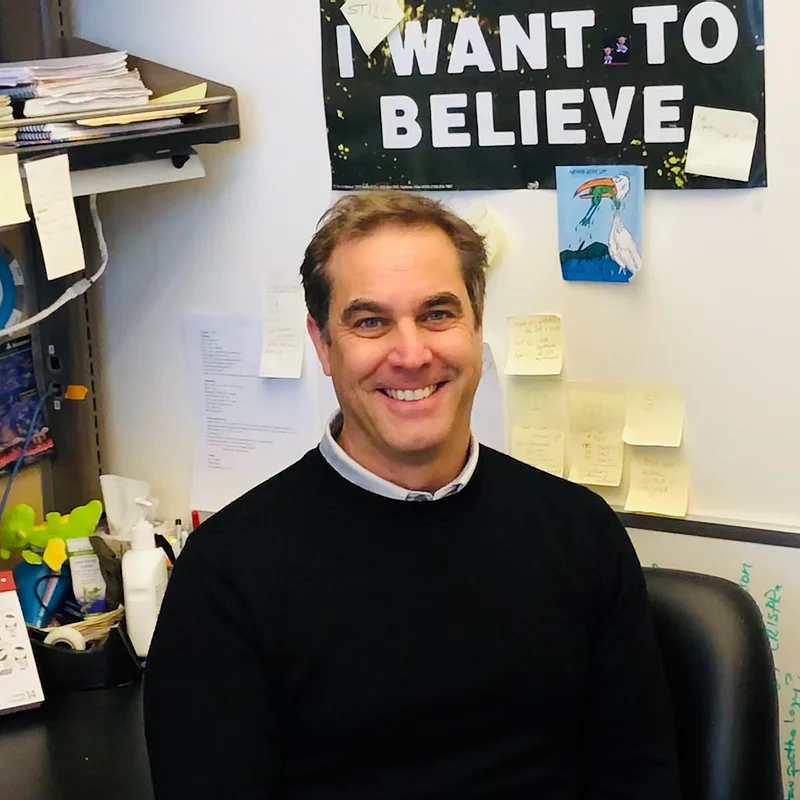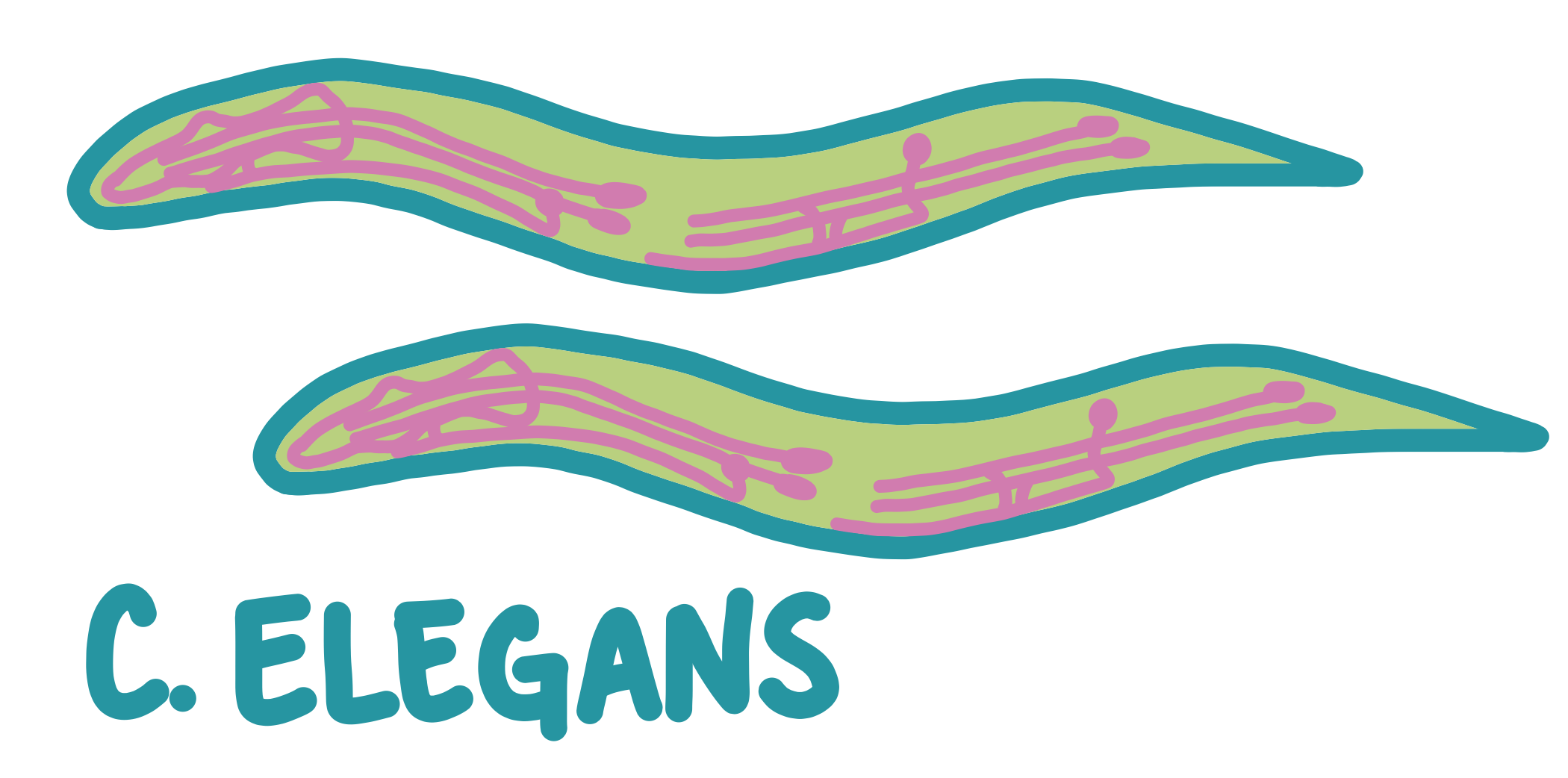

Andy found his first scientific interest on his parents’ bookshelf when he was around six or seven years old: a book about sharks. He was (and is) terrified of sharks, but was nonetheless fascinated to learn that sharks did not have any bones. However, he was not exactly the typical science nerd in school. “When I was in high school, I was not a very good student,” he says, “Actually, the first high school I went to, I was politely asked to leave.” Andy realized that he had to dramatically improve his academics if he wanted to go to college and study science. The most difficult subject for him was chemistry. He figured if he could turn it around in chemistry, he could turn it around in any subject. Thanks to his efforts and a teacher who took Andy under his wing, he never received a grade lower than a B for the rest of his education, and was accepted to study chemistry at Texas A&M University.

Andy packed his bags and moved from Nevada to College Station, Texas. He quickly realized he was not going to be very happy there. Freshmen were not allowed to do research, so Andy wasn’t able to pursue his scientific interests. He decided he was going to transfer to the University of California, Davis, but missed the cutoff date. Instead, he enrolled at the University of Nevada, Reno, a small state college close to his childhood home. Once there, he got a paid position in the lab of Ardythe McCracken, which supported him as he paid his way through college. Guided by the excellent mentorship of his undergraduate advisor, Andy studied how an organelle called the endoplasmic reticulum (ER) degrades malfunctional proteins. Once graduation came around, he applied to both PhD and MD programs. However, Andy had enjoyed his undergraduate thesis project so much it became clear to him that he wanted to pursue a PhD. He struggled to explain this decision to his parents, who weren't familiar with PhD careers. “I told my parents that I could go be an MD, which is the equivalent of being the mechanic at the car shop,” he explains, “People with the car come in, I diagnose it, I fix it. And I told my parents that I'd rather build the car.”
Andy’s dream was to do his graduate work with Randy Schekman at the University of California, Berkeley. Andy had met Randy at a conference, and Randy was very impressed with him, so he helped Andy apply to Berkeley. Once he arrived at Berkeley, Andy was met with the pleasant surprise of his first paycheck, since he had not realized he would get paid to go to graduate school. He completed his first rotation in the Schekman lab as planned, and intended to use the two other compulsory rotations to learn techniques that would be useful to him. During his third rotation with Jasper Rine, he fell in love with his rotation project and the techniques used in the Rine lab. Thankfully, Randy held no hard feelings when Andy changed his mind and joined the Rine lab, and remains a mentor (and even lab neighbor!) to Andy today. As a graduate student, Andy studied transcriptional silencing and other genetic regulation mechanisms in yeast. While he had a very successful graduate career, Andy regrets not spending more time with his peers. “The thing is,” he explains, “I had no social life. I went to my very first beer hour the day I left graduate school.” He advises current graduate students to take the time to get to know their fellow students. “These are some of the most incredibly intellectually stimulating people you'll come across in your life. So take advantage of it.”

For his postdoctoral work, Andy moved across the Bay to work with Cynthia Kenyon at the University of California, San Francisco. He studied the determinants of longevity in a small worm called C. elegans, a project that closely informs the research Andy’s lab does to this day. After four years in the Kenyon Lab, Andy accepted his first tenure track position at the Salk Institute in La Jolla. He found it quite difficult to start his own lab, since he was expected to be the source of all ideas. However, after a few years he noticed it was all worth it as he was able to recruit incredible graduate students who brought with them their own great ideas. 11 years later, Andy was offered a faculty position in the Department of Molecular and Cell Biology at Berkeley. Once Andy arrived at Berkeley, Udi Isacoff told him that he should join the Helen Wills Neuroscience Institute. “I still don't believe that I'm a neuroscientist. It just happens that all the problems we work on end up being in the nervous system,” he says, “They don’t let me teach any neuroscience courses, which is probably good because I would be learning just as much as the students.”

Though he never wanted to quit science, Andy felt very burnt out after graduate school. He considered taking some time off and becoming a bike messenger to use another part of his brain for a while. One of the reasons behind this burnout was that he always felt like everyone around him was incredible, and that there was always someone else who was better than him. When he feels like this he likes to remember his father’s advice: you are only as good as the people around you. “We like to think of scientists as these people in lab coats working alone, never talking to anyone,” he says, “Science is hugely communicative. And our ability to communicate is just as important as doing the science.” He encourages current trainees to surround themselves with smart, capable and supportive people, and to learn from them.

Outside of the lab, Andy likes to ride his bike, especially since he used to participate in bike races when he was younger. He also likes to ski and enjoys being around mountains since he grew up in Reno, close to Lake Tahoe. “If I’m on flat land, it really bothers me,” he explains. Over the past four years, he has become a political news junkie, and spends a considerable chunk of his time following news from the White House. He is still afraid of sharks and crocodiles, but occasionally goes surfing to face his fears.